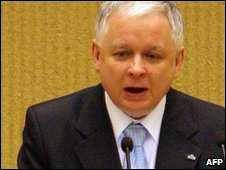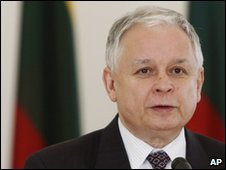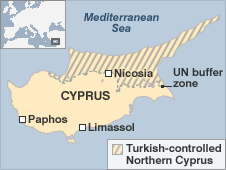The Queen has expressed her “deepest sympathy” to the Polish government and people after the death of President Lech Kaczynski in a plane crash.

Gordon Brown said the whole world would be “saddened” and Tory leader David Cameron called it a “black day”.
Rev Canon Bronislaw Gostomski, a priest at a Polish church in West London, was among those who died in the crash.
Members of the community in London are gathering at a Polish cultural centre in Hammersmith to lay flowers.
The president’s wife, Poland’s army chief, central bank governor, MPs and leading historians were among more than 80 passengers on board the flight.
Officials say his aircraft came down as it tried to land in thick fog at Smolensk airport, western Russia.
‘Just speechless’
Among the dead was the Rev Gostomski, the Polish president’s personal chaplain and the parish priest at St Andrew Bobola Polish Church in Shepherd’s Bush, west London.
A colleague, Father Marek Reczek, told the BBC Rev Gostomski was a popular figure who had been in office for eight years.
“It is a very difficult time for our parishioners. Many of them have been coming into the church to pray,” he said. “They have been crying.”
He said a special mass to honour the memory of Rev Gostomski will be held next Tuesday at the church, starting at 1900.
At the Polish Information Centre in Hammersmith, Szymon Nadolski said it did not matter if people supported the president.
“They are still our president and intellectuals,” said the 30-year-old. “I think everybody will be united regardless of who they support.”
Monika Skowronska, vice chairman of the Polish Social and Cultural Association, said she knew one of the passengers – Ryszard Kaczorowski, the last President of the Polish Government-in-Exile.
“I’m in complete and utter shock. I am trying hard not to cry. People are just speechless,” she said.
‘Biggest tragedy’
Members of the Polish community in the UK have been e-mailing the BBC since the news broke.
Marcin, from London, said: “I was shocked when I discovered what happened in Smolensk this morning.
“It is the biggest tragedy in the history of Poland, because so many very important people have died at the same time.”
Many of the messages make reference to the purpose of the president’s visit to Russia.
Maciej, also from London, said: “What makes this news more sad is that they were flying to mark the 70th anniversary of the Katyn massacre, which was such a blow to our nation.”
The Katyn forest massacre was the mass murder of thousands of Polish officers and intellectuals, carried out by Soviet forces in 1940.
Sabina Kubica, originally from Krakow but now living in Edinburgh, wrote: “I’m absolutely shocked and deeply sad. This might be one of the darkest days.”
Mr Brown broke off from campaigning in Scotland to pay tribute to the Polish president.
“I think the whole world will be saddened and in sorrow as a result of the tragic death in a plane crash of President Kaczynski and his wife Maria and the party that were with them,” he said.
“We know the difficulties that Poland has gone through, the sacrifices that he himself made as part of the Solidarity movement.
Mr Cameron said he was a “very brave Polish patriot who stood up for freedom”.
“He suffered hugely under communism and always stood up for his beliefs, and for his great faith in his country,” he added.
BBC








 Is time running out for a deal in Cyprus?
Is time running out for a deal in Cyprus?